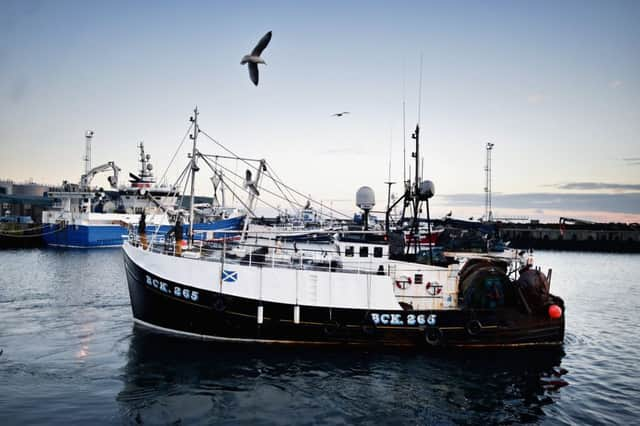Heather Hamilton: Weighing anchor endangers fish stocks


Leaving the EU is a huge risk for UK fishermen. It would threaten the fish stocks they rely on and the seas they fish in.
The Common Fisheries Policy is working. Stock levels are increasing – the recovery of North Sea cod proves this. And now, under the reformed CFP, sustainable catch levels are a legal requirement, allowing fish stocks to recover and the healthy oceans and industry that follow. This will be put at risk if the UK leaves the EU and the CFP.
Advertisement
Hide AdAdvertisement
Hide AdSome say the CFP has been imposed on us from above. In fact, the UK had one of the strongest voices in reforming the law. Common laws like the CFP are the only way to manage common resources like fish, which have little respect for national boundaries. If we stay in the EU, we have a much stronger bargaining position.
Rather than all decisions being made in Brussels, the CFP is now very decentralised. The regionalisation reforms ushered in mean decisions are taken locally. Countries with fishing interests in different waters must now work together to agree management and conservation measures.
Brexit supporters seem to think we could manage fisheries and protect seas more effectively on our own. They argue that were we to leave the EU, we could keep neighbouring countries out of our waters. Quite apart from ignoring historic agreements, this would be almost impossible to enforce. It would very likely result in the UK having its access to waters and markets in these countries curtailed. In reality, we would need to negotiate a whole new set of fishing rights. And you can bet that wouldn’t be top of our neighbours’ to-do list. The process would take years and to expect other countries to welcome us to their waters with open arms is naive.
Some Brexit supporters point to agreements made with Norway, Iceland and the Faroe Islands. It is important to remember that these countries are further from their neighbours than the UK. Many Brexit supporters’ arguments also appear to be based on the idea of “UK fish”. For almost all species around the UK’s coasts, this is a false notion, as shown by the Marine Conservation Society. Fish move, irrespective of political boundaries. This is particularly true for some of the UK’s most lucrative fisheries, like mackerel, herring and cod.
If George Eustice, head of Defra and a prominent Leave supporter, is to be believed, a post-Brexit UK would still retain quotas, the discard ban and sustainable fishing limits. But these are some of the main reasons fishing Brexiteers want to leave the EU. The truth is, no one knows how fisheries would be managed if we left the EU. But it is unlikely to benefit UK fishermen, as many industry concerns about quotas stem from how the UK government itself distributes its fishing quotas.
Brexit rhetoric ignores the fact that healthy fish stocks need a healthy marine environment. The EU Habitats and Birds Directives protect large parts of our oceans, including areas that support fish stocks. These laws would cease to apply if the UK left the EU. The Marine Strategy Framework Directive, requiring EU marine waters to reach “good environmental status” by 2020, may also be in jeopardy.
How the UK government would address these issues if it left the EU is far from clear. But what is clear is that with all EU environmental law, the UK could have gone further and implemented stronger environmental measures. But it overwhelmingly has not. In a post-Brexit world, the likelihood of the UK quickly and adequately passing laws to safeguard fish stocks, now and in the future, is remote.
So what now? At present we have a CFP that, if given the chance, can dramatically improve fish stocks. We have a CFP that provides the impetus to use more selective fishing techniques and to minimise the impact of fishing on the marine environment. We have EU environmental law that bolsters this, providing high levels of protection for seas.
Advertisement
Hide AdAdvertisement
Hide AdAlternatively we could just let all of this wash away, lose our seat at an important table and reduce our influence in fisheries decision-making. We could jeopardise both the marine environment and the fishing industry. It is not a difficult choice – ClientEarth chooses Europe, the CFP and healthy seas for UK industry.
Heather Hamilton is an environmental lawyer at ClientEarth